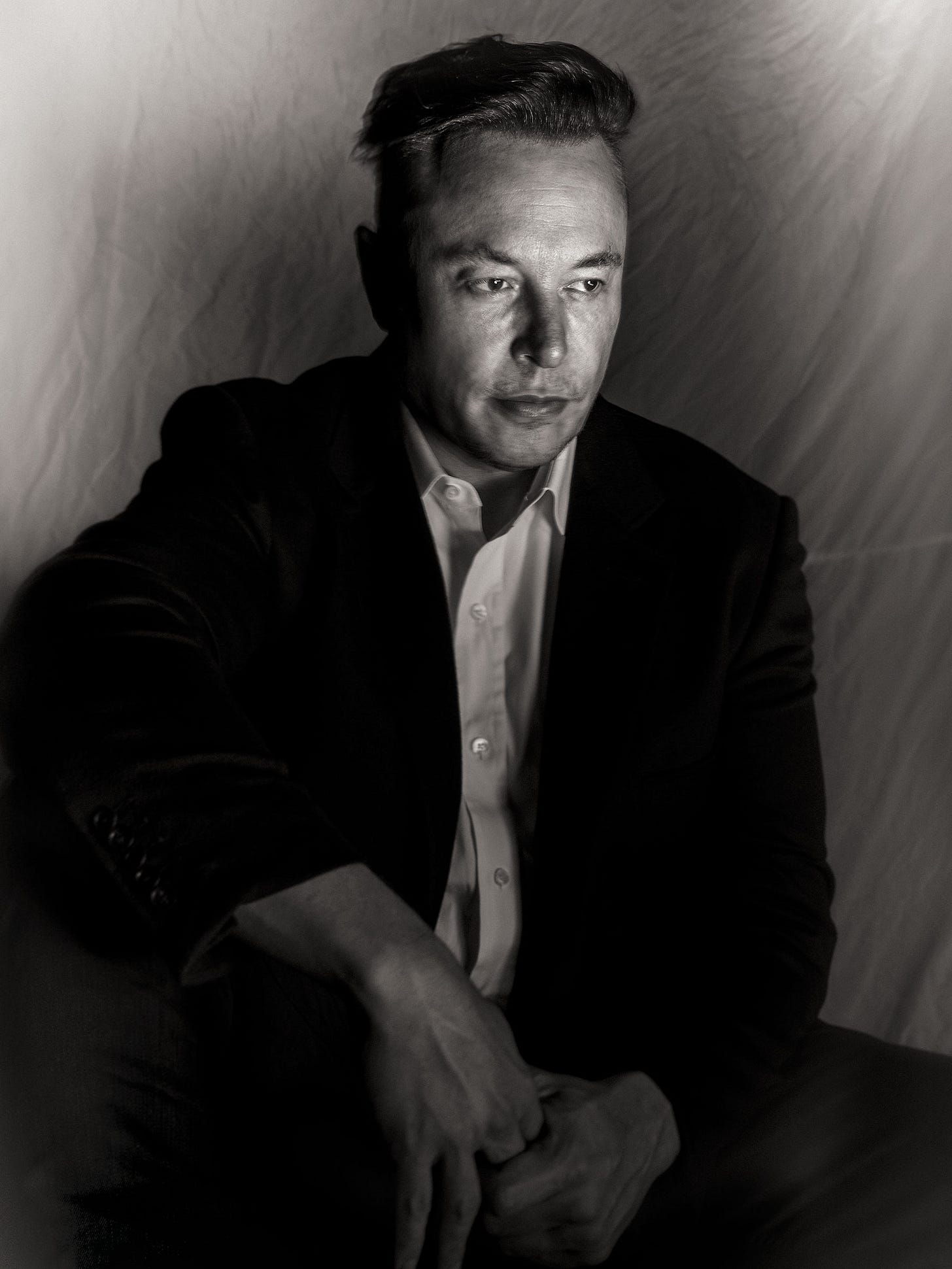⤴ Is Elon Musk left, right ... or something else?
Maybe think in terms of unicorns rather than elephants or donkeys
“I hope the future is more fun and interesting, and we’re just trying to make it that way.” - Elon Musk on the Joe Rogan Experience, May 7, 2020
“GOP excited over Elon Musk becoming Twitter’s largest shareholder,” concludes right-wing newspaper The Washington Times. The piece includes quotes from Republican lawmakers expressing hope the entrepreneur’s surprise investment will lead to a more permissive content moderation policy — as well as the return of America’s 45th president to the microblogging platform.
“I just can’t wait to have President Trump back on Twitter,” said Rep. Lauren Boebert, a Colorado Republican. “I actually put out a tweet, a little over a week ago, saying Elon needed to buy Twitter and fix this.”
Today, conservatives see Musk as a social media savior and occasional Twitter tweaker of lefties such as Sens. Bernie Sanders and Elizabeth Warren. Even better for righties, Musk is a Joe Rogan fan.

Not long ago, however, the right frequently railed against the CEO of Tesla and SpaceX as a climate change–promoting “crony capitalist.” His electric car company used to greatly benefit from a generous US tax credit for electric vehicle purchases, and in 2010 during the Obama administration, it received a $465 million loan from a 2010 Energy Department program that offered funding to auto companies looking to make greener vehicles. (Tesla repaid the loan in May 2013, with $12 million in interest.)
Then there’s Musk’s rocket company, which has landed billions in NASA and Pentagon contracts. Musk’s various ventures have also received state government subsidies over the years.
Neither this, nor that
So a question: Where do you place Elon Musk politically, on the left or the right? A few years ago, Musk described himself as “half Democrat, half Republican.” His Time magazine Person of the Year profile snarked that Mars-loving Musk has “disavowed terrestrial political affiliations.”
Sorting through his various political positions won’t be much help. He seems to like carbon taxes and the notion of a universal basic income. Billionaire taxes and regulation not so much. An immigrant himself, Musk disagreed with Donald Trump’s immigration policies. He’s pro-vaccine, but against COVID-19 mandates. And about his adopted country, he’s said “America is the land of opportunity — there is no other country where I could have done this.”
Like many Silicon Valley entrepreneurs and technologists, Musk isn’t so easy to slot on the traditional left-right spectrum, much less place in the D or R bucket. Here's technology journalist Greg Ferenstein, who's conducted research on the politics of tech:
Tech startup founders see the government as an investor in citizens, rather than as a protector from capitalism. Founders share all the stereotypical fervor for the free market as libertarians, but they also believe the government has a duty to actively help citizens solve global problems. … Technologists want the government to be an investor in citizens, rather than as a protector from capitalism. They want the government to heavily fund education, encourage more active citizenship, pursue binding international trade alliances, and open borders to all immigrants. It combines the meritocracy obsession of libertarians with the collectivism of liberals.
Does that description fit Musk? Some bits perhaps, but maybe not others. Of course, the inability to easily classify techpreneurs is kind of the point. I was asked the “left or right” question by Time magazine reporter Molly Ball for her Person of the Year profile on Musk. My answer about his ideological leanings: “The reason it’s confusing is it’s not on the traditional left-right spectrum. It’s a politics of progress. It’s a view that says the solution to man’s problems is growth and technological progress and maximizing human potential. It’s not a view fully represented by either side in this country.”
Looking beyond left or right — or maybe above
Playing off the nickname for billion-dollar startups, maybe we should call such folks existing with the two parties Unicorn Democrats and Unicorn Republicans. Or, as I recently wrote, maybe it’s the Up Wing Ds and Up Wing Rs. From my (paywall-down) essay “Forget about Left Wing and Right Wing. How about an Up Wing America?”:
The core claim of Up Wing thinking is this: A vibrant and resilient society is one with a firm belief that tomorrow can be better than today — that is, if we choose to make it so. An Up Wing society is a “no pain, no gain” society. It accepts the necessity of change, although sometimes really uncomfortable, as it strives to generate fast economic growth through scientific discovery, technological invention, commercial innovation, and high-impact entrepreneurship. Up Wingers are all about acceleration for solving big problems, effectively tackling new ones, and creating maximum opportunity for all Americans.
You don’t have to think Musk a warm and cuddly character, or even an admirable one, to be an Up Winger. I find his Twitter behavior to often be appallingly unserious for someone in his position and with his influence. In that Time profile, Robert Zubrin, founder of the Mars Society, says, “He is a humanist — not in the sense of being a nice person, because he isn’t.” Being an Up Winger doesn’t mean being a Musk fanboy or fangirl, even if he represents Up Wing thinking in many ways. Let me put it this way:
If you think generating faster technological progress and more rapid long-term economic growth is the key to higher incomes, more opportunity, and healthier lives for all Americans, you might be an Up Winger.
If you worry about economic inequality mostly because so many Americans seem unable to more fully maximize their human potential, you might be an Up Winger.
If you see the internet as a great example of US government science research combining with private-sector innovation to make something wonderful, you might be an Up Winger.
If you fear climate change but reject claims that stopping it requires consigning our children to lives less full and prosperous than ours, you might be an Up Winger.
If you wish Hollywood made more TV shows and films about how humanity can outthink its biggest problems as opposed to reveling in computer-generated catastrophe, you might be an Up Winger.
Thinking about solutions and trade-offs, not mindless optimism
Up Wing thinking doesn’t mean ignoring that tech progress has risks and can cause problems. The same sort of AI that can help with drug discovery can also invent lethal new molecules. And Musk has notably warned about the dangers of out-of-control AI, even calling it the “single biggest existential crisis” that humanity faces. But just as technology can cause problems, it can provide the solutions. Economic historian Joel Mokyr:
Whenever a technological solution is found for some human need, it creates a new problem. As Edward Tenner put it, technology ‘bites back’. The new technique then needs a further ‘technological fix’, but that one in turn creates another problem, and so on. The notion that invention definitely ‘solves’ a human need, allowing us to move to pick the next piece of fruit on the tree is simply misleading.
Or to quote astronaut Mark Watney from The Martian (film and book):
At some point, everything's gonna go south on you and you're going to say, this is it. This is how I end. Now you can either accept that, or you can get to work. That's all it is. You just begin. You do the math. You solve one problem and you solve the next one, and then the next. And If you solve enough problems, you get to come home.
That’s a very Musk-like philosophy. A very Up Wing philosophy. And, to be honest, a very American philosophy. (Benjamin Franklin was a total Up Winger.) Or at least it used to be. And the point of this newsletter is to make it that way again.
Thanks for reading this far! Just a quick note for first-time visitors and free subscribers. In my twice weekly issues for paid subscribers, I typically also include a short, sharp Q&A with an interesting thinker, in addition to a long-read essay. Here are some recent examples:
Silicon Valley historian Margaret O’Mara on the rise of Silicon Valley
Innovation expert Matt Ridley on rational optimism and how innovation works
Existential risk expert Toby Ord on humanity’s precarious future
More From Less author Andrew McAfee on economic growth and the environment
A Culture of Growth author and economic historian Joel Mokyr on economic growth
Physicist and The Star Builders author Arthur Turrell on the state of nuclear fusion








